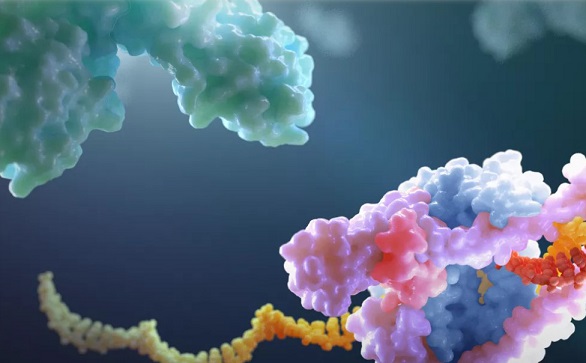Antithrombin III binds to Syndecan-4 protein, inhibiting SARS-CoV-2 cellular entry
Nikhil Prasad Fact checked by:Thailand Medical News Team Jul 10, 2024 9 months, 2 weeks, 2 days, 19 hours, 57 minutes ago
COVID-19 News: Understanding Antithrombin III
Antithrombin III (ATIII) is a powerful natural anticoagulant produced in the liver. Its primary role is to inhibit blood clotting by interacting with specific enzymes in the coagulation system. Additionally, ATIII has anti-inflammatory properties, making it a key player in controlling inflammation in the body. This
COVID-19 News report delves into the recent findings on ATIII's interaction with SARS-CoV-2, the virus responsible for COVID-19, and its implications for treatment and vaccination.
 Antithrombin III binds to Syndecan-4 protein, inhibiting SARS-CoV-2 cellular entry
The Role of Syndecans in Viral Entry
Antithrombin III binds to Syndecan-4 protein, inhibiting SARS-CoV-2 cellular entry
The Role of Syndecans in Viral Entry
Syndecans are transmembrane proteins found on the surface of many cells, including endothelial cells lining blood vessels. They play a crucial role in cellular communication and are involved in various processes such as cell adhesion, migration, and signal transduction. Specifically, syndecan-4 (SDC4) has been identified as a key receptor for ATIII on endothelial cells. Syndecans also facilitate the entry of SARS-CoV-2 into cells, making them significant in understanding how the virus infects host cells.
ATIII's Inhibition of SARS-CoV-2
In the study conducted by Anett Hudák, Dávid Pusztai, Annamária Letoha, and Tamás Letoha from Pharmacoidea Ltd-Hungary and the University of Szeged-Hungary, the researchers explored how ATIII affects the entry of SARS-CoV-2 into host cells. They discovered that ATIII binds to all syndecan isoforms, with the highest affinity for SDC4. By binding to SDC4, ATIII significantly reduces the virus's ability to enter cells, suggesting a competitive inhibition mechanism at the SDC binding sites. This finding opens new avenues for developing treatments that enhance ATIII activity to combat COVID-19.
Experimental Findings
The researchers used cell lines that overexpress different syndecan isoforms to study ATIII's attachment and its impact on viral entry. They found that overexpressing SDC4 in cells increased ATIII attachment, while removing heparan sulfate (HS) chains from SDC4 reduced ATIII attachment by about 50%. This highlights the critical role of HS chains in ATIII's interaction with SDC4.
In experiments with the SARS-CoV-2 virus, ATIII reduced the virus's entry into cells overexpressing SDC4 by approximately 27% compared to 18% in wild-type cells. This demonstrates ATIII's potential to inhibit viral entry, particularly in cells with high levels of SDC4.
Implications for COVID-19 Treatment
These findings have significant implications for COVID-19 treatment. Enhancing ATIII activity or preventing its displacement from endothelial cells could reduce thrombotic and inflammatory complications in COVID-19 patients. This approach could also inform the design and administration of COVID-19 vaccines to minimize potential thrombotic risks, ensuring safer immunization
strategies.
Moreover, understanding the interaction between ATIII and syndecans could lead to new therapeutic strategies for managing other viral infections and inflammatory diseases. By targeting the mechanisms that facilitate viral entry and modulate inflammatory responses, researchers can develop more effective treatments for a range of conditions.
The study also found that the virus or its spike protein decreases the availability of SDCs on the cell surface, reducing ATIII’s cellular attachment and hence contributing to a procoagulant environment characteristic of COVID-19.
The Future of ATIII Research
Further research is needed to explore the full therapeutic potential of ATIII, particularly its role in managing hypercoagulability and inflammatory responses in severe viral infections. Investigating how ATIII interacts with other cellular components and its effects in different tissue types will provide deeper insights into its mechanisms of action.
Additionally, studying the impact of genetic variations in syndecan isoforms and their expression levels in different populations can help tailor treatments to individual patients. Personalized medicine approaches that consider these variations could improve treatment outcomes and reduce adverse effects.
Conclusion
The study findings offer promising insights into the role of ATIII in inhibiting SARS-CoV-2 entry into host cells. By enhancing ATIII activity and preventing its displacement from endothelial cells, new therapeutic strategies can be developed to combat COVID-19 and other viral infections.
The study findings were published in the peer-reviewed International Journal of Molecular Sciences.
https://www.mdpi.com/1422-0067/25/14/7534
For the latest
COVID-19 News, keep on logging to Thailand Medical News.
Read Also:
https://www.thailandmedical.news/news/the-huwe1-a-host-protein-that-is-an-ally-of-sars-cov-2
https://www.thailandmedical.news/news/cullin-5-cul5-complex-offers-new-hope-for-covid-19-treatment-by-disabling-orf9b-proteins
https://www.thailandmedical.news/news/breaking-doctor-from-uc-san-diego-warns-of-new-covid-19-manifestations-such-as-dermatomyositis-muscular-pains-and-alerts-about-lung-fibrosis
